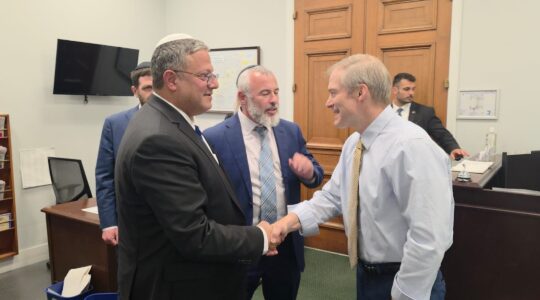WASHINGTON (JTA) — By nominating a suspect in the bombing of an Argentine Jewish center to be his defense minister, the president of Iran has given a boost to the campaign for tougher sanctions against his country.
At least that’s the hope of Jewish groups leading the charge to stop Tehran’s suspected pursuit of nuclear weapons.
Even if the nomination last week of Ahmad Vahidi does not have a significant effect on U.S. strategy for dealing with Iran, it could provide insight into the Iranian regime and the thinking of President Mahmoud Ahmadinejad. According to at least one expert on Iran and several Jewish organizational leaders, Ahmadinejad’s move was a demonstration of how little Iranian leaders care about international opinion as well as a signal that hardliners are in control in the Islamic Republic.
Vahidi, who served as deputy defense minister in Ahmadinejad’s first term, is one of five Iranians wanted in connection with the 1994 bombing of the AMIA Jewish center in Buenos Aires, which killed 85 people and is believed to have been carried out by one of Iran’s proxies, the Lebanese-based terrorist group Hezbollah.
Vahidi, a former commander of the Quds Force, an elite unit of Iran’s Revolutionary Guard, is suspected of helping to plan and finance the attack. The international police agency Interpol has issued a “red notice” for Vahidi seeking his arrest and extradition.
The Vahidi appointment comes as the Jewish community gears up for a major effort to press for tougher U.S. sanctions against Iran. Hundreds of Jewish community leaders are slated to visit Washington for meetings with congressional lawmakers and White House officials Sept. 10, and a massive rally is planned outside the United Nations in New York City two weeks later, when Ahmadinejad is scheduled to address the U.N. General Assembly.
The Obama administration said earlier this month that in September it would reassess its policy of diplomatic engagement toward Iran, around the time of the opening of the General Assembly. Published reports have discussed the introduction of sanctions stopping the export of refined petroleum.
So far, the U.S. administration has been cautious in responding to the nomination of Vahidi. State Department Spokesman Ian Kelly called the nomination “disturbing,” but he also said that he would defer further comment until Vahidi officially takes office.
“He has to go through parliament and get confirmed,” Kelly said at a briefing Monday. “And I think we’ll reserve comment on him, in particular, until after this whole process plays out.”
Israeli and Argentine officials, as well as leaders of U.S. Jewish organizations, are not holding back.
Israeli Defense Minister Ehud Barak said in a statement that the Vahidi appointment “proves yet again the nature of the regime in Iran, and its leaders’ intentions.” He said, “The world must learn from this incident, and look into the intentions of the Iranian government, especially its leader, which has appointed a terrorist as its defense minister.”
Argentine officials also have reacted strongly to the nomination, with the government calling it “an affront to the victims” of the AMIA bombing.
The executive vice-chairman of the Conference of Presidents of Major American Jewish Organizations, Malcolm Hoenlein, whose group is organizing the September events in Washington and New York, said the Vahidi nomination “adds to the cumulative” case against Iran.
“It certainly sends a message that cannot be ignored and hopefully will not be ignored,” he said.
The executive director of the American Jewish Committee, David Harris, said that having a suspected terrorist running the defense ministry of a country pursuing nuclear weapons is akin to a “reality-based horror film.” Harris noted that Vahidi’s involvement in the AMIA bombing demonstrates that the threat of Iran reaches far beyond Israel.
That attack killed “Jews and non-Jews alike,” Harris said. “That’s an important reminder to the world.”
One Iranian expert seconded the view that the appointment demonstrates that Ahmadinejad and Iran’s other leaders “simply don’t care” about the international repercussions of their actions.
The Vahidi selection “underlines their indifference to international opinion on these issues,” said Shaul Bakhash, a Iranian-born professor of Middle East history at George Mason University. “The flaunting of international opinion is part of Ahmadinejad’s style.”
The naming of Vahidi raises the question of whether the Iranian government, consumed with internal struggles, is not ready to engage with the West, seeing any outreach as an indication of “weakness,” he said. Bakhash noted that such a top appointment could not have been made without the approval of Iranian Supreme Leader Ayatollah Ali Khamenei and said it was also likely a sign that Khamenei is being driven by the increased influence — in the wake of post-election unrest — of hardliners in the security and intelligence services.
Bakhash said the nomination “complicates” Obama’s plans to engage with the Iranian government.
“This clearly gives us an indication of what lies ahead” from the Iranians, said the executive vice-president of B’nai B’rith International, Dan Mariaschin, who called the appointment a slap in the face. “It dispels any doubt as to where this government is going,” on the nuclear program and other issues, he said.
If tougher U.S. sanctions on Iran are to have any real bite, though, everyone agreed that the Europeans, Russia and China must also get on board.
One test on that front will be if, as most defense ministers do, Vahidi tries to travel — and if Interpol member states respect or ignore the Interpol notice.
“If he can blithely land in Europe, that in itself is quite telling,” Harris said. “If he has to stay cloistered,” and can only visit friendly states like North Korea and Venezuela because he’ll be picked up elsewhere, “wouldn’t that be a remarkable global response.”
JTA has documented Jewish history in real-time for over a century. Keep our journalism strong by joining us in supporting independent, award-winning reporting.





